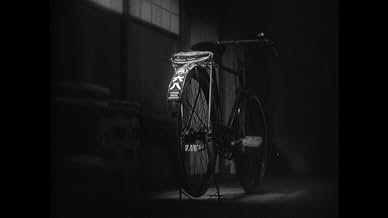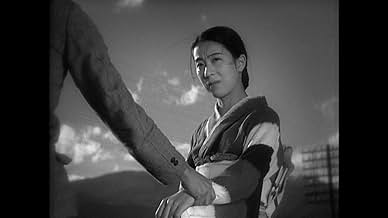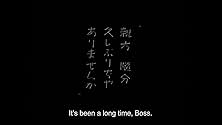CALIFICACIÓN DE IMDb
7.6/10
3.7 k
TU CALIFICACIÓN
La amante de un actor elabora un plan para dañar al hijo de su amante.La amante de un actor elabora un plan para dañar al hijo de su amante.La amante de un actor elabora un plan para dañar al hijo de su amante.
- Premios
- 1 premio ganado en total
Kôji Mitsui
- Shinkichi
- (as Hideo Mitsui)
Emiko Yagumo
- Otaka
- (as Rieko Yagumo)
Chishû Ryû
- Shouting audience member
- (sin créditos)
- Dirección
- Guionistas
- Todo el elenco y el equipo
- Producción, taquilla y más en IMDbPro
Opiniones destacadas
(1934) A Story Of Floating Weeds
SILENT DRAMA
Co-written and Directed by Yasujirô Ozu centering on a small traveling theater group going from village to village similar to what a circus does. The leader of this troupe is Kihachi (Takeshi Sakamoto) who happens to be stopping by at a village who once had an affair with an old flame who happens to also have a well groomed teenage son with goals to go to college and Kihachi who from the time he was young has always pose as his uncle and not as his biological dad since he travels a lot and is always absent. While hanging around, and as a result of spending a great deal of time with him as opposed to spending time with his current mistress he's been traveling with, this mistress becomes jealous and tries to sabotage this relationship by asking one of the young teenage girls in the troupe to make a play for him. It really takes about 45 minutes to get involved with the story since that is how long it takes for the viewers to fully understand it's characters and it's situations. Some of the more memorable moments are the little boy traveling with the theater troupe who at times doesn't look like he was acting but was improvising which he's character was almost absent in the 1959 colored talking version!
Co-written and Directed by Yasujirô Ozu centering on a small traveling theater group going from village to village similar to what a circus does. The leader of this troupe is Kihachi (Takeshi Sakamoto) who happens to be stopping by at a village who once had an affair with an old flame who happens to also have a well groomed teenage son with goals to go to college and Kihachi who from the time he was young has always pose as his uncle and not as his biological dad since he travels a lot and is always absent. While hanging around, and as a result of spending a great deal of time with him as opposed to spending time with his current mistress he's been traveling with, this mistress becomes jealous and tries to sabotage this relationship by asking one of the young teenage girls in the troupe to make a play for him. It really takes about 45 minutes to get involved with the story since that is how long it takes for the viewers to fully understand it's characters and it's situations. Some of the more memorable moments are the little boy traveling with the theater troupe who at times doesn't look like he was acting but was improvising which he's character was almost absent in the 1959 colored talking version!
This is one of the earliest Ozu films widely available, and the Criterion version is outstanding in quality.
Its a perfect example of Ozu at his best. Its a gem of a film - beautifully shot, a perfect structure, funny, sad and fascinating. The story is simple enough - a traveling troupe arrive at a town, not realizing the reason the chief actor picked the town is because an old flame of his lives here with his son. His current girlfriend in her jealousy tries to stir things up, but things don't turn out as either expect.
What is most striking about the film is just how modern it seems. The characters are believable and funny, the female characters are strong and willful, while even the minor characters are nicely sketched out. The acting is nothing short of brilliant, which makes the whole film very entertaining - this is no period piece of academic interest only, its a great work of art and a wonderful film - a masterpiece really.
Its a perfect example of Ozu at his best. Its a gem of a film - beautifully shot, a perfect structure, funny, sad and fascinating. The story is simple enough - a traveling troupe arrive at a town, not realizing the reason the chief actor picked the town is because an old flame of his lives here with his son. His current girlfriend in her jealousy tries to stir things up, but things don't turn out as either expect.
What is most striking about the film is just how modern it seems. The characters are believable and funny, the female characters are strong and willful, while even the minor characters are nicely sketched out. The acting is nothing short of brilliant, which makes the whole film very entertaining - this is no period piece of academic interest only, its a great work of art and a wonderful film - a masterpiece really.
This film is full of the sensitive observation, the slow-building tragic emotion and the moral ambiguity of Ozu's later works. While eschewing the cheap tragedy that was already so fashionable in Japanese melodrama (you can imagine the story going in that direction for any other director), the ending leaves the viewer uncertain and unsettled, with only the vaguest hopes for all concerned.
Apart from the depiction of a rundown and pathetic acting troupe (it reminds me of Alan Mowbray's drunken Shakespearian actor in 'My Darling Clementine'), and the rural small-town atmosphere, what lingers on in the mind is the portrait of an extremely flawed man. Like the great male characters of American cinema, Ichikawa is decent but ruled by anger, regret, and a certain way of life. will Ichikawa ever really be able to change, or do justice to those he feels responsible for? But after all, actors will be actors...
In fact, if this film is to be criticized for anything, it should be done so for its lack of a really detailed look into the lives and profession of the actors. After all, Ichikawa's profession turns out to play such an important part, in the end, in the fate of his 'family'.
Ozu's direction of women (particularly Ichikawa's wronged, but vengeful, lover) is sensitive and truthful, while his his direction of children is, as always, well-observed and hilarious.
Apart from the depiction of a rundown and pathetic acting troupe (it reminds me of Alan Mowbray's drunken Shakespearian actor in 'My Darling Clementine'), and the rural small-town atmosphere, what lingers on in the mind is the portrait of an extremely flawed man. Like the great male characters of American cinema, Ichikawa is decent but ruled by anger, regret, and a certain way of life. will Ichikawa ever really be able to change, or do justice to those he feels responsible for? But after all, actors will be actors...
In fact, if this film is to be criticized for anything, it should be done so for its lack of a really detailed look into the lives and profession of the actors. After all, Ichikawa's profession turns out to play such an important part, in the end, in the fate of his 'family'.
Ozu's direction of women (particularly Ichikawa's wronged, but vengeful, lover) is sensitive and truthful, while his his direction of children is, as always, well-observed and hilarious.
I was able to see The Story of Floating Weeds for the first time recently, thanks to the Criterion Collection's DVD.
I was led to it when I came across Roger Ebert's list of his ten favorite films (written some time ago).
In his notes, Ebert claims Ozu shows us a "different cinematic language" but I find that kind of talk so much blather. Ozu uses his shots effectively to allow the actors to communicate the emotions being portrayed, especially necessary in this silent film.
A third rate company of traveling actors returns to a town after four years. The leader of the troupe had abandoned his lady in this town years before in order to tour with his company. He has fathered a son by the woman, whom he visits whenever he can, but his paternity is kept secret from his son.
What follows is the exposure of the secret and the effect it has on the lives of everyone involved, and some innocent bystanders as well.
The camera is almost always objective, the acting style is somewhat less melodramatic than in American silent films. There are excellent performances by all.
No time period is given for the story, but I have to assume it is earlier than the year the film was made (1934) because there are no automobiles, no radios, no telephones.
The enjoyment of Floating Weeds lies in the story itself and the ability of the director to tell it compellingly. If you demand car chases or food fights, this is not for you.
The Criterion DVD allows you to watch with or without the specially commissioned score. For first viewing, I recommend without.
I was led to it when I came across Roger Ebert's list of his ten favorite films (written some time ago).
In his notes, Ebert claims Ozu shows us a "different cinematic language" but I find that kind of talk so much blather. Ozu uses his shots effectively to allow the actors to communicate the emotions being portrayed, especially necessary in this silent film.
A third rate company of traveling actors returns to a town after four years. The leader of the troupe had abandoned his lady in this town years before in order to tour with his company. He has fathered a son by the woman, whom he visits whenever he can, but his paternity is kept secret from his son.
What follows is the exposure of the secret and the effect it has on the lives of everyone involved, and some innocent bystanders as well.
The camera is almost always objective, the acting style is somewhat less melodramatic than in American silent films. There are excellent performances by all.
No time period is given for the story, but I have to assume it is earlier than the year the film was made (1934) because there are no automobiles, no radios, no telephones.
The enjoyment of Floating Weeds lies in the story itself and the ability of the director to tell it compellingly. If you demand car chases or food fights, this is not for you.
The Criterion DVD allows you to watch with or without the specially commissioned score. For first viewing, I recommend without.
Remakably similar in structure yet different in tonal effect to Ozu's more famous 1959 remake, this story of a travelling troupe's last days in a seaside village was one of Ozu's first forays into a quiet, rural background, though it still feels brisk compared to the more staid and sumptuous remake. The depictions of stage life are more slapstick-oriented than in the remake (most notably in Tokkan Kozo's hilarious turn in a full-sized dog costume), but are counterbalanced by sensitive portrayals of all the characters, especially the great, dignified lead performance by Takeshi Sakamoto. The romantic interludes are as powerful as in the remake, though without employing the overt sensuality of on-screen kissing; instead there appears to be the use of a filter or gauze to give the scenes between the young couple an otherworldly effect, which gives more emphasis of the idea of the actress employed to seduce the troupe leader's son enacting a "performance", an idea that I would have like to have seen developed even further. Even so, this is a marvellous work with a set of wonders distinguishable from that of the remake.
¿Sabías que…?
- TriviaA Moxa treatment refers to the burning of an herb called moxa (aka mugwort) on, or directly above, the skin. Recipients of the treatment generally didn't like the burning sensation on their skin, although this was supposed to enhance circulation and lymphatic flow. Also, the scent of moxa is believed to have a soothing, relaxing effect, which would have been important to counteract the skin irritation.
- Citas
Kihachi: What did you plan to do with my son?
Otaka: Who cares about your son? He's cheap, like you, playing around with actresses.
[Kihachi beats Otaka]
Otaka: Are you sorry? I hope you'll be very sorry. The world is like a lottery. You take your ups and your downs. Let's make up please. That makes us even, you see. Just think how I feel.
- Créditos curiososThe film title and credits are placed before a backdrop of plain sackcloth. This would become a trademark of Yasujirô Ozu films.
Selecciones populares
Inicia sesión para calificar y agrega a la lista de videos para obtener recomendaciones personalizadas
- How long is A Story of Floating Weeds?Con tecnología de Alexa
Detalles
- Fecha de lanzamiento
- País de origen
- Idiomas
- También se conoce como
- A Story of Floating Weeds
- Productora
- Ver más créditos de la compañía en IMDbPro
- Tiempo de ejecución1 hora 26 minutos
- Color
- Mezcla de sonido
- Relación de aspecto
- 1.37 : 1
Contribuir a esta página
Sugiere una edición o agrega el contenido que falta

Principales brechas de datos
By what name was Historia de hierbas flotantes (1934) officially released in India in English?
Responda























